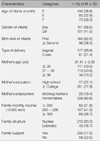Abstract
Purpose
This study was conducted to investigate infant temperament and mother-infant attachment of breast-feeding mothers with a 5 ~ 7 month old infant.
Methods
This study was descriptive research. The subjects were 258 infants and their mothers participating in 'Year 2007 Healthy Breastfed BabyContest' on September 5, 2007 and visiting a community health service center from September 1 to December 30 in 2007. The data was gathered by structured questionnaires about the Maternal Attachment Inventory (MAI) and What My baby is Like (WBL).
Figures and Tables
References
2. Andrews A.W. Changes in maternal characteristics are predictive of changes in maternal perception of infant temperament. J Community Health Nurs. 1990. 7(4):235–244.

3. Bang K.S. A study of the reliability and the validity of the infant temperament inventory. J Korean Parent Child Health. 2001. 4(2):32–41.
4. Barnes J., Ram B., Leach R., Altmann L., Sylva K., Malmberg L., Stein A.. The FCCC Team. Factors associated with negative emotional expression: A study of mothers of young infants. J Reprod Infant Psychol. 2007. 25(2):122–138.

5. Britton J.R., Britton H.L., Gronwaldt V. Breastfeeding, sensitivity, and attachment. Pediatr. 2006. 118(5):e1436–e1443.

6. Cassidy J., Shaver P.R. Handbook of attachment: theory, research and clinical application. 2002. New York: Guilford Press.
7. Coffman S., Levitt M.J., Guacci N., Silver M. Temperament and interactive effects: Mothers and infants in a teaching situation. Issues Compr Pediatr Nurs. 1992. 15(3):169–182.

8. Han J.H., Yee Y.H. The relationships between infant's temperament and infant's attachment to their mothers, and mother-infant interaction across situations. Korean J Child Stud. 2005. 26(6):287–303.
9. Han K.E. The relationship of maternal self-esteem and maternal sensitivity with mother-to-infant attachment. 2001. Seoul: Hanyang University;Unpublished master's thesis.
10. Han K.J., Bang K.S. Correlation of infant temperament, mother-infant interaction, and child-rearing environment. J Korean Acad Child Health Nurs. 2000. 6(2):132–143.
11. Jang N.Y., Yong S.H., Kim E.Y., Park Y.H., Kim J.Y. The lived experience of breastfeeding in primiparas. J Clin Nurs Res. 2005. 8:21–37.
12. Jones N.A., McFall B.A., Diego M.A. Patterns of brain electrical activity in infants of depressed mothers who breastfeed and bottle feed: the mediating role of infant temperament. Biol Psychol. 2004. 67:103–124.

13. Kim M.Y., Jang G.J. A comparative study on maternal-infant attachment and infant temperament according to the feeding methods. J Korean Soc Matern Child Health. 2009. 13(1):107–115.
14. Kim S.C., Kwak K.J. The relationship of development change of temperament and problem behaviors during infancy: Early characteristic of temperament and developmental patterns. Korean J Child Stud. 2007. 28(6):183–199.
15. Lee S.Y., Kwon I.S. A Comparative study on maternal role confidence and parenting stress according to the infant's feeding method. Korean J Women Health Nurs. 2006. 12(3):231–239.

16. Lee Y.E., Kang Y.H., Park H.S., Hwang E.J., Mun M.Y. Relationship of maternal perception of the infant temperament and confidence and satisfaction of maternal role. J Korean Acad Child Health Nurs. 2003. 9(2):206–220.
17. Ministry of Health and Welfare. The third korea national health and nutrition examination survey (KNHANES III) 2005-nutrition survey(I). 2006. Ministry of Health and Welfare.
18. Muller M.E. A questionnaire to measure mother to infant attach. J Nurs Meas. 1994. 2(2):129–141.
19. Park K.J. Relations of maternal sensitivity and temperament to infants attachment security. Korean J Child Stud. 1999. 20(3):3–17.
20. Pridham K.F., Chang A.S., Chiu Y. Mothers' parenting self-appraisals: The contribution of perceived infant temperament. Res Nurs Health. 1994. 17(5):381–392.

21. Shin Y.H. Nutritional and immunological characteristics of breast milk: A review. J Korean Parent Child Health. 2000. 3(2):94–107.
22. Worobey J. Effects of feeding method on infant temperament. Adv Child Dev Behav. 1993. 24:37–61.

23. Yun H.J., Hyun O.K. The relationship between infant temperament, mother temperament and parenting efficacy. Korean J Child Stud. 2007. 28(2):1–17.




 PDF
PDF ePub
ePub Citation
Citation Print
Print






 XML Download
XML Download